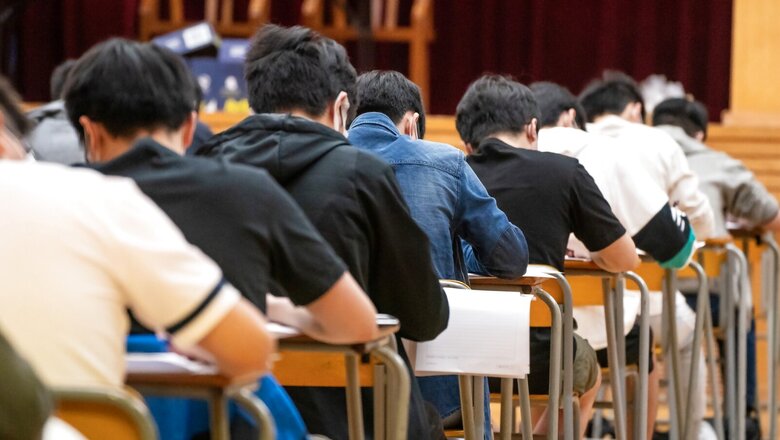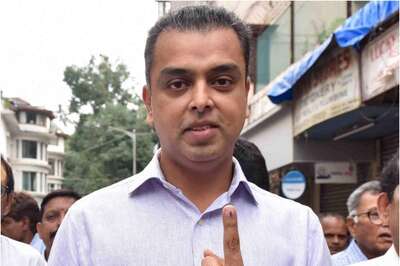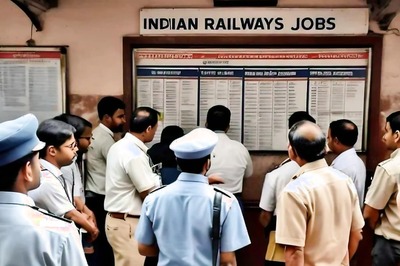
views
Credentials of foreign-educated doctors are in the spotlight, thanks to Union minister Prahlad Joshi, who has remarked that 90% of students going abroad to study medicine won’t clear Indian entrance examinations. The statement seems to obfuscate the main issue, but definitely needs rational scrutiny.
I must remind that his statement came at a time when thousands of Indian students were stuck in war-ravaged Ukraine.
First, dear minister, these students haven’t really gone out to foreign lands because they ever wanted to visit Ukraine, Bangladesh, Kyrgyzstan, Kazakhstan, Belarus or Armenia.
They probably first heard about some of these countries only when they were trying to save their dream of becoming a doctor, and settled on the bargain of going out to not-so-popular destinations to complete their MBBS program.
Let me explain to you why they had no choice but to go outside India.
My Commerce background kept me away from this ugly market where the course fees for a graduation degree – MBBS – is above (whopping) Rs 50 lakh.
Before writing this column, I spoke to four consultancies to suggest the best college in the budget of Rs 50 lakh. All of them asked me to raise my budget.
“Rs 50 lakh is too low… You should expect a budget of around Rs 80 to 85 lakh and this is just tuition fees. In popular private colleges, fees is over a crore,” said the executive on the other side of the call, mocking me.
If that’s the cost of becoming a doctor, personally, I am relieved that I never wanted to be one.
The students who dared to fulfil this expensive dream chose to go to less costly private medical colleges in foreign lands. MBBS in foreign colleges costs below Rs 30 lakh.
The issue we should all be discussing today is regulating the fees of private colleges and adding thousands of government seats.
While we scrutinise the quality of education of foreign returned doctors, we must confess that FMGE is not the right tool to comment on their credentials.
What is FMGE?
On coming back, these foreign returned doctors have to go through a mandatory screening test called Foreign Medical Graduate Examination (FMGE Test). It is mandatory for Indians holding MBBS degrees from abroad.
On clearing the test, licence to practise medicine in India is granted. The National Board of Examination, or NBE, conducts this screening test twice every year, in June and December.
If you fail to clear FMGE, you will not be able to practise medicine in India – in short, you will never become a doctor.
While screening is an important tool to keep a check on the quality of skills learnt by fresh doctors, FMGE is far from the solution.
Highest Entrance Fees with GST
The fees of FMGE is the highest for any entrance exams conducted by the Indian government on a national level.
The latest application fees for FMGE stands at Rs 7,080 per exam, which includes Rs 6,000 as exam fees and Rs 1,080 as GST. All other examination fees are exempted from GST.
The moment GST is levied on extremely expensive entrance test fees, the bias is introduced at the very first step.
In 2020, the fee was Rs 6,490 and in 2019, Rs 5,500. In 2013, the fees stood at Rs 750. The fees in the last 10 years has thus spiked by almost 10 times.
In 2013, around 10,000 students annually sat for the exam, whereas now, the number of students has increased to around 24,000. Despite an increasing number of students taking the test, the fees is going up.
Let’s compare the fees of FMGE to other national level entrance tests.
For IIT, male students pay Rs 650 and female students pay Rs 325. For UPSC, fees of Rs 100 is levied on male students and other categories, including female candidates, are exempted. For the Chartered Accountant entrance exam, fees of Rs 1,500 is charged. NEET’s (undergraduate) fees is Rs 1,500 for general category, whereas for AIIMS (undergraduate) entrance fees is also Rs 1,500.
No Rule for Re-Checking
The process is non-transparent so that students are not allowed to request re-checking of marks. It is easy to self-estimate the score after the completion of the paper, three coaching center officials – two centres in Noida and one in Surat – explained to me.
The exam involves multiple choice questions with no negative marking.
According to NBE’s rule: “There will be no re-evaluation or re-checking or re-totalling. Requests for re-evaluation/re-totalling shall not be entertained.”
“In many instances, students have scored much, much below the calculated score. It’s an MCQ paper and in our class, when we discuss answers, every student can roughly calculate the score. However, there is no rule of applying for re-checking which otherwise is available for everyone sitting for IITs or UPSC entrance,” said Neeraj Chaurasiya, CEO of Next MCI Gurukul, a coaching institute in Gautam Nagar, Noida.
Managing Director of Growell Consultancy, DN Trivedy, told me that at least four of his students – for all three to five appearances in the FMGE – attained the same score. “For example, one student got 149 marks in all his attempts in 2018, 2019 and 2020. How is this possible? And even if this is possible, then there should be some system to verify.”
Not Allowed to Discuss Question Paper
As strange as it may sound, the students have to sign a non-disclosure agreement with NBE before sitting for an entrance exam. Even after paying the hefty fees of over Rs 7,000, the students are not allowed to discuss question papers (though they all do).
According to the non-disclosure agreement: “No content of this exam must be shared with friends, acquaintances or third parties, including sharing through online means or via social media. Social media includes but is not limited to SMS, WhatsApp, Facebook, Twitter, Hangouts, blogs etc. using either one’s own account or proxy account.”
Also, it says that the “content of this exam is confidential, proprietary and is owned by NBE”.
As the candidates start the exam, the sheet of this agreement appears on the screen. They have to “accept” to start the paper. “Violation of any act or breach of the same shall be liable for penal action and cancellation of the candidature at the bare threshold,” the agreement warns.
This regulation is now obsolete, experts told me. It was needed when different sets of questions were made available on different days, but in FMGE, the rule did not make sense as it always had a single paper.
This was needed for exams such as the all-India NEET examination which was spread over four to five days and different question papers came on different days.
No Syllabus or Reference Book for FMGE Preparation
All top notch exams, including IIT and UPSC, have a defined area from where questions can be asked. But under FMGE where students appearing have MBBS degree, an undergraduate level, questions from post-graduation level are asked.
The NBE has not released any book for FMGE preparation and there are no previous year question papers due to the non-disclosure agreements.
Will Desi MBBS Students Survive FMGE?
A million-dollar question. So far, students studying in Indian medical colleges have not been tested for their medical credentials based on FMGE. It is only the foreign students who are asked to go through the screening test.
An audit conducted in 2018 by NBE’s former director Bipin Batra showed that around 25% students from private medical colleges cleared the exam.
Good news is the government has decided to replace FMGE with another exam called NEXT. This exam will be taken by both foreign returned doctors and final-year MBBS students.
Dear minister, it’s good to raise questions, not fingers.
Read all the Latest News India and Breaking News here
















Comments
0 comment